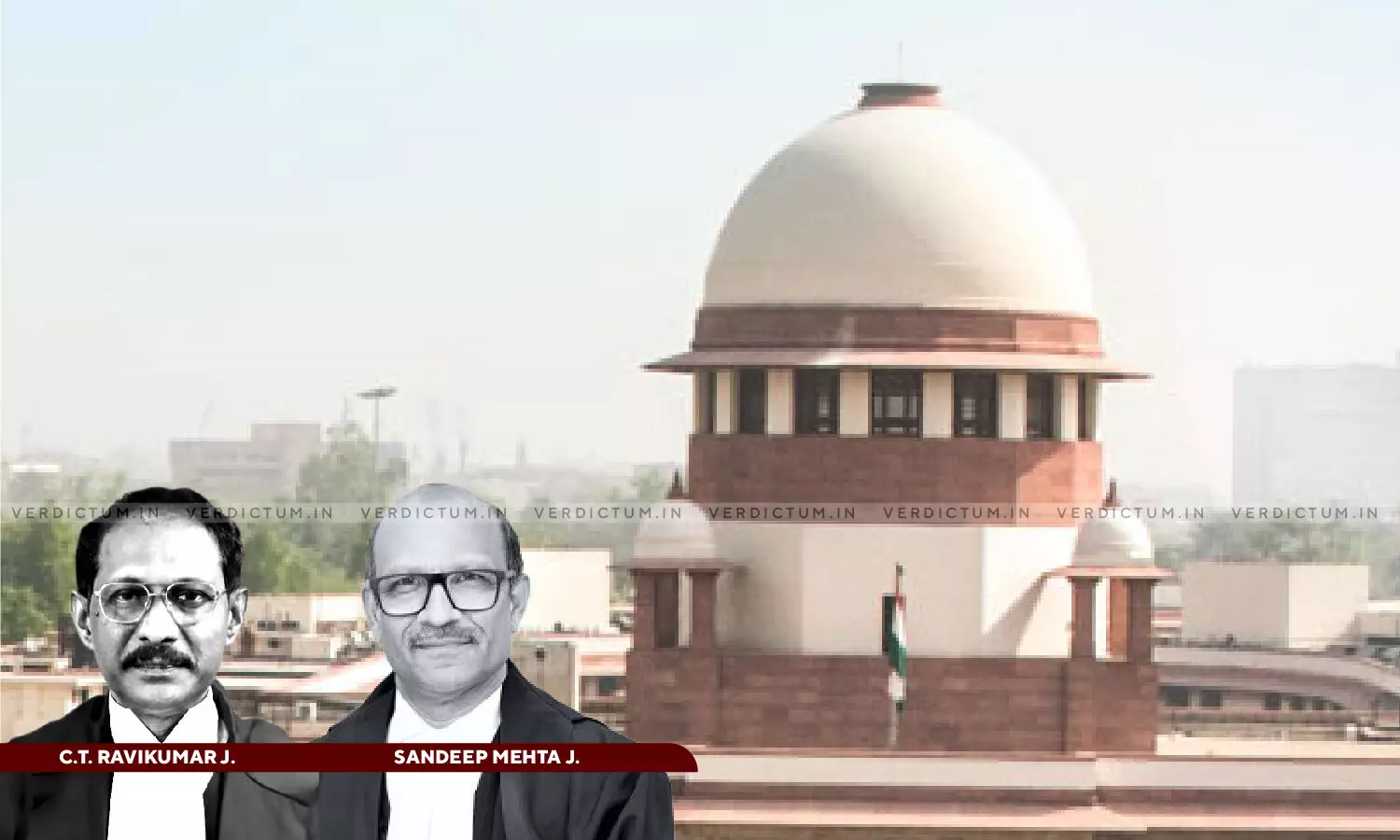
Trial Stands Vitiated If A Fatal Non-Compliance Of Section 313(1)(b) CrPC Results In Material Prejudice To Convict: SC
 |
|The Supreme Court remarked that in case a fatal non-compliance in the matter of questioning under Section 313(1)(b) of the Criminal Procedure Code (CrPC) results in material prejudice to any convict, the trial should stand vitiated.
The Court remarked thus in a criminal appeal filed by a man challenging his confirmation of conviction by the Delhi High Court for the offence of murder.
The two-Judge Bench of Justice C.T. Ravikumar and Justice Sandeep Mehta said, “Culpability can be fixed, if at all it is to be fixed, on the accused upon conclusive proof of the same established by the prosecution only after following various procedural safeguards recognizing certain rights of an accused. Failure to comply with such mandatory procedures may even vitiate the very trial, subject to the satisfaction of conditions, therefor. Foremost among one such right is embedded in Section 313 of the Code of Criminal Procedure, 1973 (for short the ‘Cr.PC’). Though questioning under clause (a) of sub-Section (1) of Section 313, Cr.PC, is discretionary, the questioning under clause (b) thereof is mandatory. Needless to say, a fatal non-compliance in the matter of questioning under Clause (b) of sub-section (1) thereof, in case resulted in material prejudice to any convict in a criminal case the trial concerned, qua that convict should stand vitiated.”
The Bench also remarked that births of crimes and culprits concerned, occur together and yet, under the criminal justice delivery system only on concluding findings on commission of the crime concerned in the affirmative, the question whether the accused is its culprit would arise.
Advocate S.D. Singh appeared on behalf of the appellant while Senior Advocate Sonia Mathur appeared on behalf of the respondent.
Brief Facts -
The appellant challenged the confirmation of his conviction under Section 302 of the Indian Penal Code (IPC), with the aid of Section 34 IPC under the judgment in the criminal appeal passed by the High Court. As per the prosecution, an argy-bargy over spilling of drops of water over the roof of the appellant’s house while the sister of the deceased was cleaning the chajja (parapet) of their house, resulted in the accurst incident. Enraged by the dropping of water over the roof, the appellant’s wife hurled filthy words at deceased’s sister. Then the appellant came out and he, too, started abusing and thereupon, the deceased asked him to stop abusing his sister. The appellant exhorted his brother to come out and finish them and soon he came out with a knife.
The appellant caught hold of the deceased and his brother stabbed on his chest repeatedly with the knife. Taking note of the necroscopic evidence corroborating the events unfolded through the oral testimonies of the eye-witnesses, the Trial Court found that the homicidal death amounts to murder and culpability was fixed on the first accused (appellant’s brother). The conviction of the appellant was then made and he was awarded imprisonment for life. His conviction was confirmed by the High Court and being aggrieved, he approached the Apex Court.
The Supreme Court in view of the facts and circumstances of the case observed, “We have already held that whether [sic] non questioning or inadequate questioning on incriminating circumstances to an accused by itself would not vitiate the trial qua the accused concerned and to hold the trial qua him is vitiated it is to be established further that it resulted in material prejudice to the accused. True that the onus to establish the prejudice or miscarriage on account of non-questioning or inadequate questioning on any incriminating circumstance(s), during the examination under Section 313, Cr.PC, is on the convict concerned. We say so, because if an accused is ultimately acquitted, he could not have a case that he was prejudiced or miscarriage of justice had occurred owing to such non-questioning or inadequate questioning.”
The Court enunciated that when the finding of common intention was based on the twin incriminating circumstances and when they were not put to the appellant while he was being questioned under Section 313 CrPC, and when they ultimately culminated in his conviction under Section 302 IPC, with the aid of Section 34 IPC, and when he was awarded with the life imprisonment consequently, it can only be held that the appellant was materially prejudiced and it had resulted in blatant miscarriage of justice.
“The failure as above is not a curable defect and it is nothing but a patent illegality vitiating the trial qua the appellant. … Once, the upshot of the discussion is above, we do not think it proper to deal with the innumerable grounds raised by the appellant, not only because it has become unnecessary but also such consideration may adversely affect the co-accused whose appeal was also decided under the very same common judgment impugned in this appeal”, it added.
Furthermore, the Court noted that the incident occurred more than 29 years ago and the appellant had already undergone incarceration more than 12 years and hence, in such circumstances, if he is again subjected to examination under Section 313 CrPC, it would cause further prejudice to him in view of the patent illegality occurred qua the appellant. Therefore, it said that the conviction of the appellant could not be sustained.
Accordingly, the Apex Court allowed the appeal, set aside the impugned judgment, and acquitted the appellant.
Cause Title- Naresh Kumar v. State of Delhi (Neutral Citation: 2024 INSC 464)
Appearance:
Appellant: Advocate S. D. Singh, AOR Bharti Tyagi, Advocates Shweta Singh, Ram Kripal Singh, and Siddharth Singh.
Respondent: Senior Advocates Sonia Mathur, Swarupama Chaturvedi, AOR Mukesh Kumar Maroria, Advocates Ruchi Kohli, Noor Rampal, and Shantnu Sharma.